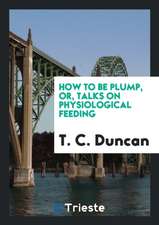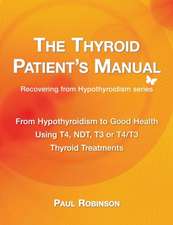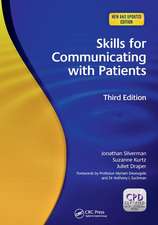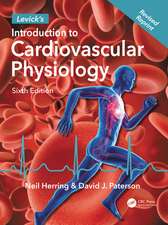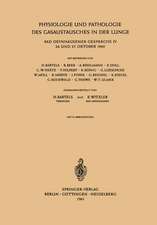Sport, Recovery, and Performance: Interdisciplinary Insights
Editat de Michael Kellmann, Jürgen Beckmannen Limba Engleză Hardback – 10 noi 2017
Including chapters written by its leading experts, the book represents an important milestone in this evolving field of study. It covers issues around measuring recovery, the impact of overtraining on sleep and mental health, and addresses topics such as the impact of travel on performance. The book informs not only how managing recovery can improve performance, but also offers insights in how recovery can sustain athletes’ physical and mental health.
Citing research from a range of individual and team sports, as well as extreme situations and the workplace, this is an important book that will be widely read across the sport sciences.
| Toate formatele și edițiile | Preț | Express |
|---|---|---|
| Paperback (1) | 415.42 lei 6-8 săpt. | |
| Taylor & Francis – 30 oct 2017 | 415.42 lei 6-8 săpt. | |
| Hardback (1) | 764.20 lei 6-8 săpt. | |
| Taylor & Francis – 10 noi 2017 | 764.20 lei 6-8 săpt. |
Preț: 764.20 lei
Preț vechi: 1027.43 lei
-26% Nou
Puncte Express: 1146
Preț estimativ în valută:
146.23€ • 156.37$ • 121.92£
146.23€ • 156.37$ • 121.92£
Carte tipărită la comandă
Livrare economică 17 aprilie-01 mai
Preluare comenzi: 021 569.72.76
Specificații
ISBN-13: 9781138287761
ISBN-10: 1138287768
Pagini: 284
Ilustrații: 32
Dimensiuni: 156 x 234 x 22 mm
Greutate: 0.45 kg
Ediția:1
Editura: Taylor & Francis
Colecția Routledge
Locul publicării:Oxford, United Kingdom
ISBN-10: 1138287768
Pagini: 284
Ilustrații: 32
Dimensiuni: 156 x 234 x 22 mm
Greutate: 0.45 kg
Ediția:1
Editura: Taylor & Francis
Colecția Routledge
Locul publicării:Oxford, United Kingdom
Public țintă
Academic, Postgraduate, Professional, Professional Practice & Development, and UndergraduateCuprins
Preface
Part I: Conceptualizing the problem
Chapter 1: Monitoring the recovery-stress state in athletes
Chapter 2: Developing athlete monitoring systems: Theoretical basis and practical applications
Chapter 3: Perceptions and practices of recovery modalities in elite team athletes
Part II: Psychophysiological determinants of under-recovery
Chapter 4: Overtraining – what do we know?
Chapter 5: Recovery-stress balance and psychobiosocial states monitoring of road cyclists
Chapter 6: Psychophysiological features of soccer players‘ recovery-stress balance during the in-season competitive phase
Chapter 7: Managing the training load of overreached athletes: Insights from the tapering and detraining literature
Chapter 8: Recovery-stress balance and injury risk in team sports
Chapter 9: Stress, underrecovery and health problems in athletes
Chapter 10: Quantification of training and competition loads in endurance sports: A key to stress-recovery balance and performance
Part III: The impact of sleep on recovery.
Chapter 11: The role of sleep in maximising performance in elite athletes
Chapter 12: Sleep, dreams and athletic performance
Chapter 13: Domestic and international travel: Implications for performance and recovery in team-sport athletes
Part IV: Transfer to related areas.
Chapter 14: What do sport coaches know about recovery?
Chapter 15: Stress and recovery in extreme situations
Chapter 16: Stress and recovery in applied settings: Long working hours, recovery, and breaks
Chapter 17: Psychological relaxation techniques to enhance recovery in sports
Chapter 18: Sport, recovery and performance: A concluding summary
Part I: Conceptualizing the problem
Chapter 1: Monitoring the recovery-stress state in athletes
Chapter 2: Developing athlete monitoring systems: Theoretical basis and practical applications
Chapter 3: Perceptions and practices of recovery modalities in elite team athletes
Part II: Psychophysiological determinants of under-recovery
Chapter 4: Overtraining – what do we know?
Chapter 5: Recovery-stress balance and psychobiosocial states monitoring of road cyclists
Chapter 6: Psychophysiological features of soccer players‘ recovery-stress balance during the in-season competitive phase
Chapter 7: Managing the training load of overreached athletes: Insights from the tapering and detraining literature
Chapter 8: Recovery-stress balance and injury risk in team sports
Chapter 9: Stress, underrecovery and health problems in athletes
Chapter 10: Quantification of training and competition loads in endurance sports: A key to stress-recovery balance and performance
Part III: The impact of sleep on recovery.
Chapter 11: The role of sleep in maximising performance in elite athletes
Chapter 12: Sleep, dreams and athletic performance
Chapter 13: Domestic and international travel: Implications for performance and recovery in team-sport athletes
Part IV: Transfer to related areas.
Chapter 14: What do sport coaches know about recovery?
Chapter 15: Stress and recovery in extreme situations
Chapter 16: Stress and recovery in applied settings: Long working hours, recovery, and breaks
Chapter 17: Psychological relaxation techniques to enhance recovery in sports
Chapter 18: Sport, recovery and performance: A concluding summary
Notă biografică
Prof. Dr Michael Kellmann is Head of Unit of Sport Psychology at the Faculty of Sport Science at Ruhr University Bochum, Germany. He is also Honorary Professor in the School of Human Movement and Nutrition Sciences at the University of Queensland, Australia.
Prof. Dr Jürgen Beckmann is Chair of Sport Psychology at the Department of Sport and Health Sciences at Technical University of Munich, Germany. He was president of the German Society for Sport Psychology (asp), editor in chief of the German Journal of Sport Psychology, and on the editorial board of several international journals (currently Frontiers in Psychology).
Prof. Dr Jürgen Beckmann is Chair of Sport Psychology at the Department of Sport and Health Sciences at Technical University of Munich, Germany. He was president of the German Society for Sport Psychology (asp), editor in chief of the German Journal of Sport Psychology, and on the editorial board of several international journals (currently Frontiers in Psychology).
Recenzii
‘Fifteen years after the publication of Enhancing Recovery it is time for another resource that brings together cutting-edge research on the importance of recovery for athletic performance and health. Michael Kellmann and Jürgen Beckmann have gathered the world’s leading scholars from both psychology and physiology in a joint perspective on recovery research and its practical application. This book’s interdisciplinarity is unique and an advancement that many other research areas could profit from. I recommend this book to anyone who wants to learn from the best on how to improve the performance and health of athletes by enhancing their recovery.’ – Dr. Anne-Marie Elbe, President of FEPSAC (European Federation of Sport Psychology)
Descriere
Bringing together some of the world‘s leading experts, this multi-disciplinary collection examines both the psychological and physiological dimensions to recovery from sport. Featuring chapters on overtraining, sleep, the relationship to injury, as well as the role of stress, the book illustrates how performance, both as an individual and within of a team, can be better managed through understanding the recovery process. Also including chapters discussing the impact of travel on performance, as well as guidance on measurement and training, this is an important book for students and scholars across sports science as well as any coach interested in the latest research.




